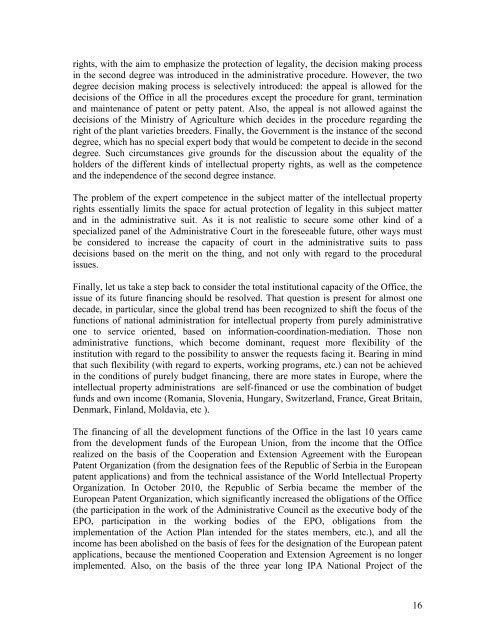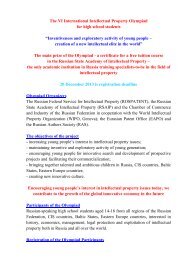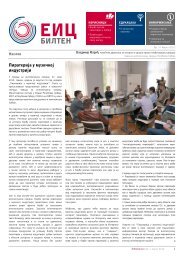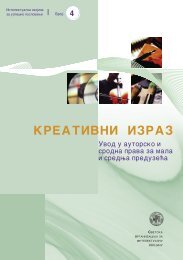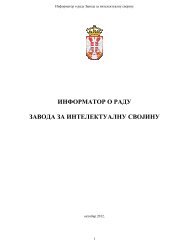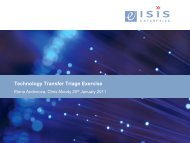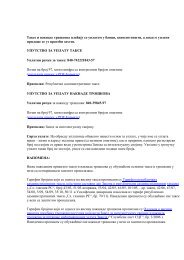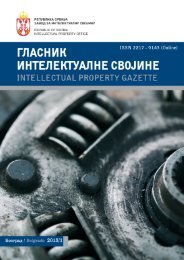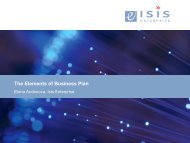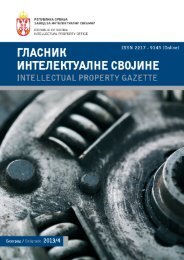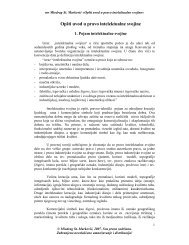Strategy of the intellectual property development for the period of ...
Strategy of the intellectual property development for the period of ...
Strategy of the intellectual property development for the period of ...
You also want an ePaper? Increase the reach of your titles
YUMPU automatically turns print PDFs into web optimized ePapers that Google loves.
ights, with <strong>the</strong> aim to emphasize <strong>the</strong> protection <strong>of</strong> legality, <strong>the</strong> decision making processin <strong>the</strong> second degree was introduced in <strong>the</strong> administrative procedure. However, <strong>the</strong> twodegree decision making process is selectively introduced: <strong>the</strong> appeal is allowed <strong>for</strong> <strong>the</strong>decisions <strong>of</strong> <strong>the</strong> Office in all <strong>the</strong> procedures except <strong>the</strong> procedure <strong>for</strong> grant, terminationand maintenance <strong>of</strong> patent or petty patent. Also, <strong>the</strong> appeal is not allowed against <strong>the</strong>decisions <strong>of</strong> <strong>the</strong> Ministry <strong>of</strong> Agriculture which decides in <strong>the</strong> procedure regarding <strong>the</strong>right <strong>of</strong> <strong>the</strong> plant varieties breeders. Finally, <strong>the</strong> Government is <strong>the</strong> instance <strong>of</strong> <strong>the</strong> seconddegree, which has no special expert body that would be competent to decide in <strong>the</strong> seconddegree. Such circumstances give grounds <strong>for</strong> <strong>the</strong> discussion about <strong>the</strong> equality <strong>of</strong> <strong>the</strong>holders <strong>of</strong> <strong>the</strong> different kinds <strong>of</strong> <strong>intellectual</strong> <strong>property</strong> rights, as well as <strong>the</strong> competenceand <strong>the</strong> independence <strong>of</strong> <strong>the</strong> second degree instance.The problem <strong>of</strong> <strong>the</strong> expert competence in <strong>the</strong> subject matter <strong>of</strong> <strong>the</strong> <strong>intellectual</strong> <strong>property</strong>rights essentially limits <strong>the</strong> space <strong>for</strong> actual protection <strong>of</strong> legality in this subject matterand in <strong>the</strong> administrative suit. As it is not realistic to secure some o<strong>the</strong>r kind <strong>of</strong> aspecialized panel <strong>of</strong> <strong>the</strong> Administrative Court in <strong>the</strong> <strong>for</strong>eseeable future, o<strong>the</strong>r ways mustbe considered to increase <strong>the</strong> capacity <strong>of</strong> court in <strong>the</strong> administrative suits to passdecisions based on <strong>the</strong> merit on <strong>the</strong> thing, and not only with regard to <strong>the</strong> proceduralissues.Finally, let us take a step back to consider <strong>the</strong> total institutional capacity <strong>of</strong> <strong>the</strong> Office, <strong>the</strong>issue <strong>of</strong> its future financing should be resolved. That question is present <strong>for</strong> almost onedecade, in particular, since <strong>the</strong> global trend has been recognized to shift <strong>the</strong> focus <strong>of</strong> <strong>the</strong>functions <strong>of</strong> national administration <strong>for</strong> <strong>intellectual</strong> <strong>property</strong> from purely administrativeone to service oriented, based on in<strong>for</strong>mation-coordination-mediation. Those nonadministrative functions, which become dominant, request more flexibility <strong>of</strong> <strong>the</strong>institution with regard to <strong>the</strong> possibility to answer <strong>the</strong> requests facing it. Bearing in mindthat such flexibility (with regard to experts, working programs, etc.) can not be achievedin <strong>the</strong> conditions <strong>of</strong> purely budget financing, <strong>the</strong>re are more states in Europe, where <strong>the</strong><strong>intellectual</strong> <strong>property</strong> administrations are self-financed or use <strong>the</strong> combination <strong>of</strong> budgetfunds and own income (Romania, Slovenia, Hungary, Switzerland, France, Great Britain,Denmark, Finland, Moldavia, etc ).The financing <strong>of</strong> all <strong>the</strong> <strong>development</strong> functions <strong>of</strong> <strong>the</strong> Office in <strong>the</strong> last 10 years camefrom <strong>the</strong> <strong>development</strong> funds <strong>of</strong> <strong>the</strong> European Union, from <strong>the</strong> income that <strong>the</strong> Officerealized on <strong>the</strong> basis <strong>of</strong> <strong>the</strong> Cooperation and Extension Agreement with <strong>the</strong> EuropeanPatent Organization (from <strong>the</strong> designation fees <strong>of</strong> <strong>the</strong> Republic <strong>of</strong> Serbia in <strong>the</strong> Europeanpatent applications) and from <strong>the</strong> technical assistance <strong>of</strong> <strong>the</strong> World Intellectual PropertyOrganization. In October 2010, <strong>the</strong> Republic <strong>of</strong> Serbia became <strong>the</strong> member <strong>of</strong> <strong>the</strong>European Patent Organization, which significantly increased <strong>the</strong> obligations <strong>of</strong> <strong>the</strong> Office(<strong>the</strong> participation in <strong>the</strong> work <strong>of</strong> <strong>the</strong> Administrative Council as <strong>the</strong> executive body <strong>of</strong> <strong>the</strong>EPO, participation in <strong>the</strong> working bodies <strong>of</strong> <strong>the</strong> EPO, obligations from <strong>the</strong>implementation <strong>of</strong> <strong>the</strong> Action Plan intended <strong>for</strong> <strong>the</strong> states members, etc.), and all <strong>the</strong>income has been abolished on <strong>the</strong> basis <strong>of</strong> fees <strong>for</strong> <strong>the</strong> designation <strong>of</strong> <strong>the</strong> European patentapplications, because <strong>the</strong> mentioned Cooperation and Extension Agreement is no longerimplemented. Also, on <strong>the</strong> basis <strong>of</strong> <strong>the</strong> three year long IPA National Project <strong>of</strong> <strong>the</strong>16


